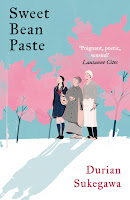Book Review: Sweet Bean Paste by Durian Sukegawa (translation by Alison Watts)
 |
“All experience adds up to a life lived as only you could. I feel sure the day will come when you can say: this is my life.”
Sentaro Tsujii, once an aspiring writer, now works in the Doraharu shop making and selling dorayaki, a Japanese sweet made with pancakes and sweet bean paste. This is not his chosen vocation and his working in the shop is a means of paying off his previous debts to his employer. Having previously served a two-year prison sentence, he is also aware that his checkered past limits his options in terms of employment opportunities. He is not content with his life and listlessly passes his days. One day he meets seventy-six-year-old Tokue Yoshii, a Hansen’s Disease (leprosy) survivor who has lived in a leper’s community, ostracized from mainstream society since she was diagnosed at the age of fourteen.
Though Tokue is now cured and after the Leprosy Prevention Act had been repealed in 1996, is allowed to mix freely, her illness has partially disfigured her face and affected her fingers. She convinces him to let her work alongside him, making sweet bean paste with care and precision – a sweet bean paste that elevates the reputation of the shop and has customers lining up for more. Among the customers is school girl Wakana, who befriends Tokue and Sentaro. However, Tokue’s medical history becomes an issue that affects business and eventually results in her quitting. However, their unlikely friendship continues and they continue to meet , correspond and positively impact each other’s lives.
“It’s my belief that everything in this world has its own language. We have the ability to open up our ears and minds to anything and everything. That could be someone walking down the street, or it could be the sunshine or the wind.”
Sweet Bean Paste by Durian Sukegawa is a bittersweet, heartwarming and deeply moving story. The prose is simple yet beautiful. The vivid imagery of the sights and sounds of the busy streets, the cherry blossoms and the bustling shops and food make you feel as if you are walking with the characters as they bare their souls to one another. The author also sheds a light on the stigma and prejudice faced by people like Tokue, deprived of the life they desire. After living in a closed-off colony for decades, she now has nowhere to go even though she is free to travel. There is so much she wants to do with her life but she has been unable to. But does that render her life meaningless? What does it mean to lead a meaningful life? In a world that measures success with tangible yardsticks and visible “contribution” to society, Tokue’s wisdom as she shares with Sentaro and Wakana is in acknowledging that life lived on the fringes can also be a life worth living as long as your heart and soul are willing to experience all that world has to offer as she has strived to do despite all she has been through. As she shares her story, she teaches Sentaro that even though her life hasn't given her what she wanted, rather than brood over her past disappointments it is important to appreciate whatever she did have and how being mindful of the world around you may instigate positive change in your life and even in how you feel about yourself.
“I began to understand that we were born in order to see and listen to the world. And that’s all this world wants of us. It doesn’t matter that I was never a teacher or a member of the workforce, my life had meaning.”
This is a beautiful story, meant to be read, reread and shared with friends. This short novel is a beautiful reminder to pause, reflect and truly experience the world around us and in the process be kinder to each other and to ourselves.
Excerpt from the Author's Note:
“ Over the aeons the universe has nurtured life forms whose very awareness makes them involved in its continued existence. Hence we are all alike in having materialized on this Earth because that was what the universe so desired. The ill, the bed-ridden, and children whose lives are over before they’ve barely begun; all are equal in their relationship to the universe. Anyone is capable of making a positive contribution to the world through simple observation, irrespective of circumstance.”
Comments
Post a Comment